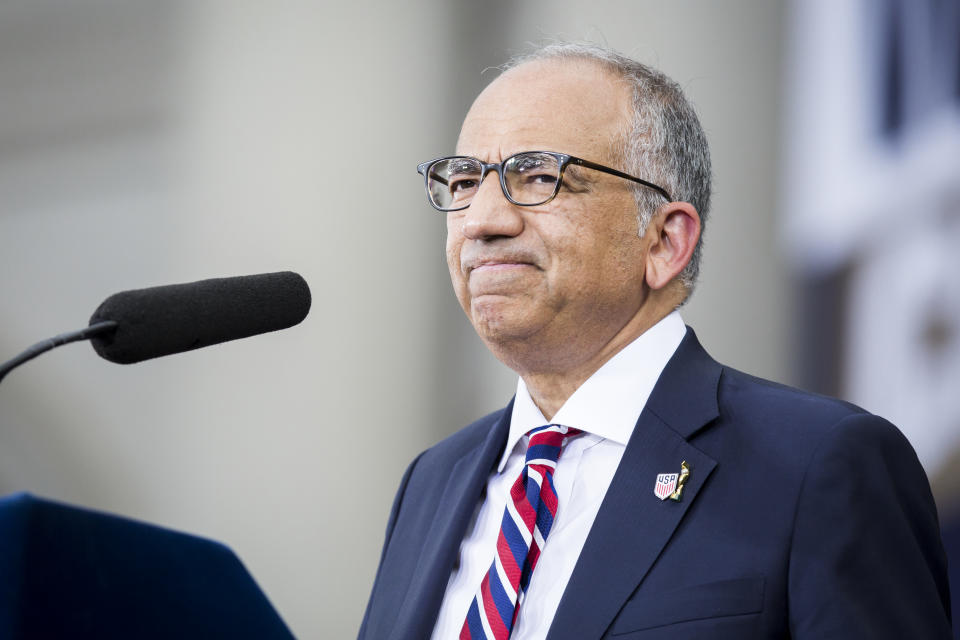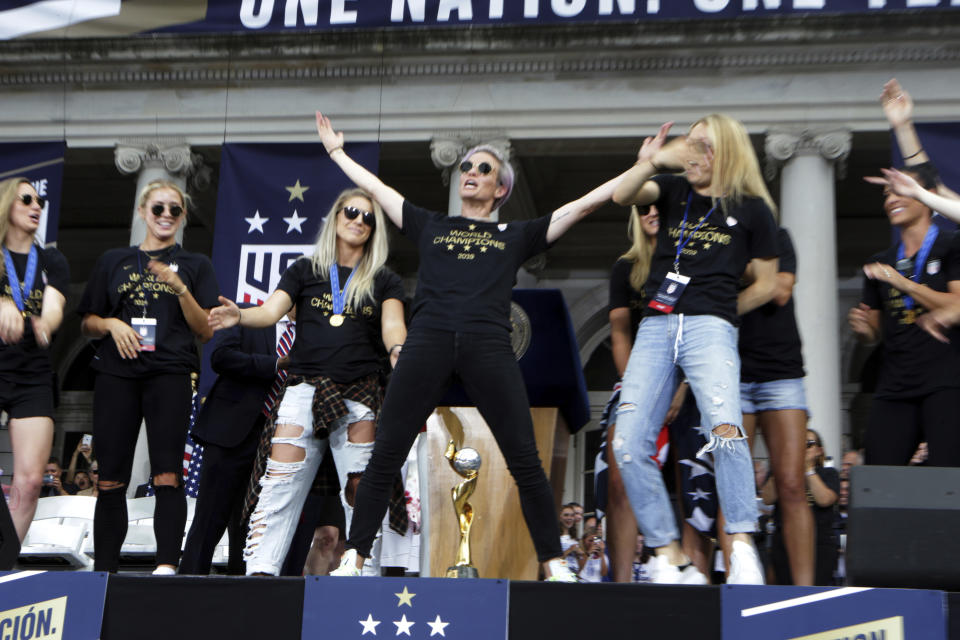U.S. Soccer breaks post-World Cup silence on equal pay, but issues persist
When the U.S. women's national team won the World Cup three weeks ago, the crowd in Lyon, France, began chanting “Equal pay! Equal pay!” Since then, the U.S. Soccer Federation has been under pressure from not just fans, but its own members, sponsors and even representatives from Congress.
Now, U.S. Soccer is breaking its silence, forcefully pushing back on the notion that the women haven't been compensated fairly. In a letter and factsheet sent to U.S. Soccer members Monday, federation president Carlos Cordeiro claims the women have actually been paid more than their male counterparts over the past decade.
According to Cordeiro, who says he directed federation staff to use actual W-2 filings and payroll records to analyze financials, the women's national team players were paid $34.1 million in game bonuses and salaries from 2010-18, while men's national team players earned $26.4 million.
“Just as our WNT players have shared their perspective, I strongly believe that you – as U.S. Soccer members, stakeholders, sponsors and partners – deserve to hear ours,” Cordeiro's letter says. “Now that the Women’s World Cup is behind us, a common understanding of key facts will also help advance our shared work to grow women’s soccer in America as well as the larger national discussion about equality.”
Ostensibly, U.S. Soccer and Cordeiro put out these figures to end the narrative that U.S. Soccer hasn't paid the women equally to the men and eliminate the term “equal pay” from the conversation, which has gained traction since the USWNT players sued their boss in March over alleged gender discrimination.
But areas of dispute – topics that will come up in mediation or, if necessary, trial – still persist.

The first issue is one that the players themselves have raised repeatedly: They have had to win to earn the compensation they do get, while the men don't have the same burden of success.
The factsheet doesn't make clear how much of the USWNT's compensation is a direct result of the fact that they won a World Cup, an Olympics and the vast majority of their friendlies in that timeframe, while the men failed to qualify for a World Cup entirely. If the women had suffered the same failures as the men, their compensation would likely be much lower.
Secondly, the federation argues that the women earn guaranteed compensation that the men's team does not in the form of salaries. While that sounds like a much better deal for the women, it's worth noting that the men's team has traditionally received at least $5,000-per-player bonuses just for losing games, which essentially act as a game-appearance fee. If the men played 20 games in a year, that's a guarantee of $100,000 without winning a single game, which is equal to the base available to members of the women's team.
(Not all women on the national team get a $100,000 salary, either. U.S. Soccer did not explain this in their factsheet, but in 2019 only 18 players were paid guaranteed salaries. That number will drop down every year, based on the collective bargaining agreement the players signed in 2017.)
In short, the women's salaries and the men's loss bonuses serve a similar function as being guaranteed compensation available for each team. So, it's not as if the women get guaranteed compensation and the men do not – it's just structured differently.
That – the difference between how the men and women are paid – is the heart of the matter and the difficulty U.S. Soccer has in trying to squelch the "equal pay" discussion. While the women haven't clearly defined what "equal pay" should look like – it may not be possible as long as the pay structures differ – it will also be hard for U.S. Soccer to argue that its pay for the women has been equal or greater.
U.S. Soccer points to other examples of the way it has supported the women beyond its investments in the men's team.

Cordeiro's letter states that U.S. Soccer has invested $18 million in founding and operating the National Women's Soccer League, which is where every member of the USWNT competes on the club level. As part of that, U.S. Soccer pays the women NWSL salaries of between $62,500 and $72,500, on top of their compensation for U.S. national team duty.
In the letter, Cordeiro points out the women get some benefits the men don't, such as maternity leave and severance. He also takes credit for health insurance offered to players on the U.S. women's team that the men's team doesn't receive. However, Yahoo Sports has been told health insurance for the women is actually provided by the U.S. Olympic Committee, and U.S. Soccer pays players $1,500 to offset the taxes players pay for the coverage.
The top line from Cordeiro's letter is clearly the new comparison he revealed, which alleges the women have paid nearly $8 million more than the men's team over the past decade. But the more important thing might be the tone he strikes. The factsheet in the letter goes out of its way to discredit the claims in the lawsuit, but then Cordeiro acknowledges that U.S. Soccer wants to do better and he vows to work with the players.
“Still, like any organization, U.S. Soccer recognizes that we can continue to improve, in partnership with our women’s players,” Cordeiro writes after explaining that the federation has treated the USWNT better than many people acknowledge. “In the weeks ahead, we’ll focus on preparing for mediation and resolving this matter in the best interests of the WNT and U.S. Soccer. I want you to know that U.S. Soccer is committed to doing right by our players, and I’ve been encouraged by the public comments from players expressing their desire for a cooperative approach. I remain optimistic that we can find common ground.”
[ Follow Yahoo Soccer on Twitter and Facebook ]
Molly Levinson, a representative for the players, however, called Cordeiro's letter and factsheet “a sad attempt by USSF to quell the overwhelming tide of support the USWNT has received from everyone from fans to sponsors to the United States Congress.”
“Any apples to apples comparison shows that the men earn far more than the women,” Levinson’s statement said. “The fact is, the women’s team requested the same compensation structure as the men have, so they would be paid equally for equal performance. USSF refused, offering lower compensation in every category for the women’s team in a pay for performance structure. That is patently unequal pay.”
“Here is what they cannot deny,” the statement continued. “For every game a man plays on the MNT he makes a higher base salary payment than a woman on the WNT. For every comparable win or tie, his bonus is higher. That is the very definition of gender discrimination. For the USSF to believe otherwise, is disheartening but it only increases our determination to obtain true equal pay. If the USSF cannot agree to this at the upcoming mediation, we will see them in the court of law and the court of public opinion.”
This issue will continue to play out in boardrooms, but at least now U.S. Soccer has told its version of the story.
Caitlin Murray is a contributor to Yahoo Sports and her book about the U.S. women’s national team, The National Team: The Inside Story of the Women Who Changed Soccer, is out now. Follow her on Twitter @caitlinmurr.
More from Yahoo Sports:
